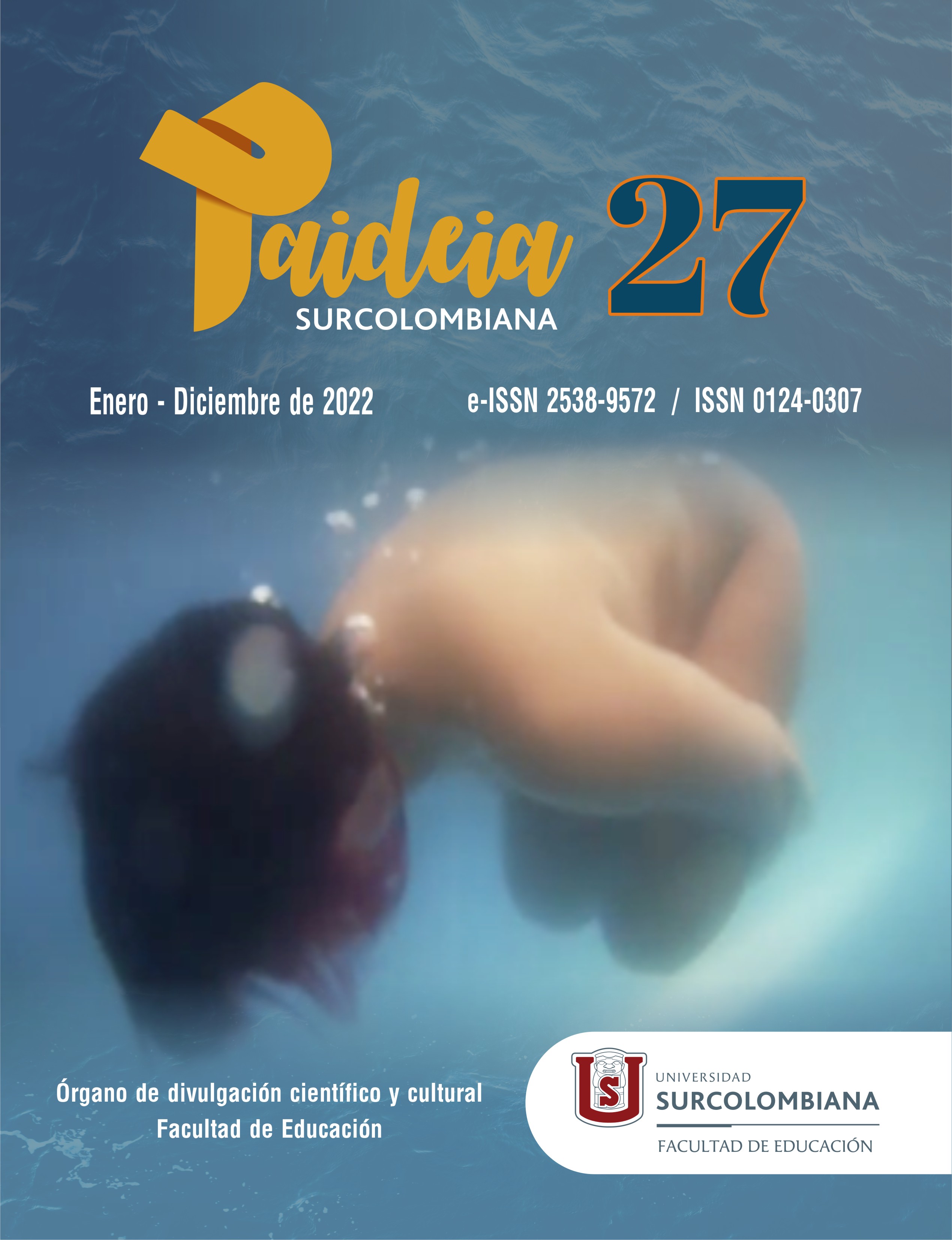Outcome expectations and their importance in the learning of high school students
##plugins.themes.bootstrap3.article.main##
This article shows the results of an investigation that set out to establish the incidence of the generation of expectations of results during the planning phase of the task, in the learning of high school students. The study population was made up of students and teachers from ten educational institutions from different regions of Colombia, some belonging to the rural context and others to the urban one. The methodology used was of a mixed nature and the scope was exploratory and descriptive; Instruments such as: survey, semi-structured interview and focus groups were used.
Among the results, the importance of developing in these students capacities to plan their academic activities and, specifically, to generate positive expectations of results during said enrollment processes is highlighted; This is based on motivation, autonomy and self-regulation. It was obtained that having expectations leads them to act with interest, security and confidence in the search and implementation of much more effective learning strategies; than to find meaning in learning for their lives, encourages them to take an active part in their own process of building new knowledge and to believe positively that they can obtain good results in their proposed objectives.
Downloads
##plugins.themes.bootstrap3.article.details##
Bandura, A. (1993). Perceived self-efficacy in cognitive development and functioning. Educational Psychologist, 28(2), 117-148. Bookrags Staff. https://www.tandfonline.com/doi/abs/10.1207/s15326985ep2802_3 https://doi.org/10.1207/s15326985ep2802_3
Cisterna, C. (2005). Categorización y triangulación como procesos de validación del conocimiento en investigación cualitativa. Theoria, 14(1), 61-71. Recuperado de: http://www.ubiobio.cl/theoria/v/v14/a6.pdf
Corral. (2010). Diseños de cuestionarios para recolección de datos. Revista ciencias de la educación, 20 (36). http://servicio.bc.uc.edu.ve/educacion/revista/n36/art08.pdf
Dávila, G. (2006). El razonamiento inductivo y deductivo dentro del proceso investigativo en ciencias experimentales y sociales. Laurus, 12, 180-205. https://www.redalyc.org/pdf/761/76109911.pdf
Domínguez, S. (2007) El análisis de información y las investigaciones cuantitativa y cualitativa. Scielo. Rev Cubana Salud Pública v.33 n.3 Ciudad de La Habana jul.-sep. 2007 https://doi.org/10.1590/S0864-34662007000300020
Fermín Torrado, Maria Soria (2016), Una aproximación al aprendizaje autorregulado en los alumnos de educación secundaria. Universidad internacional de la Rioja. Pp. 97-115. https://doi.org/10.18172/con.2838
González, F. (2006). El conocimiento y su relación con el aprendizaje de los estudiantes en las sociedades actuales. Paideia Surcolombiana, (12), 61-70. https://doi.org/10.25054/01240307.1056
Hernández, R., Fernández, C. y Baptista, P. (2006) Metodología de la investigación (4a ed.). México, D.F., México: McGraw-Hill Interamericana. https://www.academia.edu/31870211/Sampieri_et_al_metodologia_de_la_investigacion_4ta_edicion_sampieri
Hernández, R., Fernández, C. y Baptista, P. (2014). Metodología de la investigación (6a ed.). México, D.F., México: McGraw-Hill Interamericana. https://www.uca.ac.cr/wp-content/uploads/2017/10/Investigacion.pdf
Jiménez, R. (1998). Metodología de la investigación. Elementos básicos para la investigación clínica. Editorial ciencias médicas. La Habana, Cuba.
Kuhl, J. (1984). Volitional aspects of achievement motivation and learned helplessness: https://doi.org/10.1016/B978-0-12-541413-5.50007-3
Martínez, J. (2011). Métodos de investigación cualitativa. Silogismo, 8, (1-33). https://www.scirp.org/(S(vtj3fa45qm1ean45vvffcz55))/reference/ReferencesPapers.aspx?ReferenceID=1950187
Maslow, A. H. (1991). Motivación y personalidad. https://books.google.com.co/books?id=8wPdj2Jzqg0C&printsec=frontcover&dq=inauthor:%22Abraham+H.+Maslow%22&hl=es&sa=X&ved=2ahUKEwio8Prk8KjtAhXiSt8KHa0JAi0Q6AEwAHoECAQQAg#v=onepage&q&f=false
Matas, A. (2018). Diseño del formato de escalas tipo Likert: un estado de la cuestión. Revista electrónica de investigación educativa, 20(1), 38-47. http://www.scielo.org.mx/scielo.php?script=sci_arttext&pid=S1607-40412018000100038&lng=es&tlng=es. https://doi.org/10.24320/redie.2018.20.1.1347
McMillan, J., & Schumacher, S. (2005). Introducción al diseño de investigación cuantitativa (cap. 4) - Introducción al diseño de investigación cualitativa (cap. 10). Investigación educativa (5ta ed). Madrid: Pearson Education.
Panadero, E. & Tapia, J. (2014) ¿Cómo autorregulan nuestros alumnos? Revisión del modelo cíclico de Zimmerman sobre autorregulación del Aprendizaje. Anales de Psicología, 30 (2), 450-462. https://www.redalyc.org/pdf/167/16731188008.pdf https://doi.org/10.6018/analesps.30.2.167221
Panadero, E. & Tapia, J. (2014). Teorías de autorregulación educativa: una comparación y reflexión teórica. Psicología Educativa, 20(1), 11-22. https://doi.org/10.1016/j.pse.2014.05.002
Pereira, Z. (2011). Los diseños de métodos mixto en la investigación en educación: Una experiencia concreta. Revista Electrónica Educare, 15 (1), 15-29. https://www.redalyc.org/pdf/1941/194118804003.pdf https://doi.org/10.15359/ree.15-1.2
Schunk, D. H. (2002). Teorías del aprendizaje: Una perspectiva educativa. México: Pearson Educación.
Schunk, D. (2012). Teorías del aprendizaje. Una perspectiva educativa. Pearson Education. https://ciec.edu.co/wp-content/uploads/2017/06/Teorias-del-Aprendizaje-Dale-Schunk.pdf
Sierra, R. (1994). Técnicas de investigación social. Madrid: Paraninfo. https://abcproyecto.files.wordpress.com/2018/11/sierra-bravo-tecnicas-de-investigacion-social.pdf
Torrano, F. y Soria, M. (2016). Una aproximación al aprendizaje autorregulado en alumnos de educación secundaria. Contextos Educativos: Revista de Educación, 97-115. http://dx.doi.org/10.18172/con.2838
Torrano, F., y Soria, M. (2017). Diferencias de género y aprendizaje autorregulado: el efecto del rendimiento académico previo. Revista Complutense de Educación, 28(4), 1027-1042. https://doi.org/10.5209/RCED.51096
Zimmerman, B. J. (1994). Dimensions of academic self-regulation: A conceptual framework for education. En D.H. Schunk y B.J. Zimmerman (Eds.), Self-regulation of Learning and performance: Issues and educational (320-321). Hillsdale, NJ: Erlbaum.





 Perfil Google Scholar
Perfil Google Scholar









